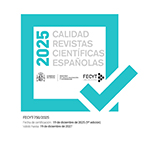Los últimos poetas hebreos de Sefarad: poesía hebrea en el mundo románico
Résumé
During the two decades of renaissance elapsed between the bloody events of 1391 and the year 1414, in which the Dispute of Tortosa concluded, a completely new phenomenon took place in the history of the Hebrew poetry in the Hispanic Kingdoms: A group of poets congregated in the Crown of Aragon that, in words of E. Fleischer, felt «linked by a kind of a friends’ pact... and considered themselves as representatives of Hebrew poetry in Spain at the moment». They are the poets of the Circle of Zaragoza, and the same as the poets of their milieu who wrote in Romance languages, they interchanged letters in form of poems and participated in contests and disputes. The master and unquestionable leader of this group was Solomon de Piera. The study of some aspects of the work of these poets, sometimes still unpublished, allows us to conclude that they were probably influenced by the surrounding atmosphere. Romance languages were their languages; they knew the poetry of their contemporaries; they used images that could have originated in the poetic competitions of the time... There is still a lot of work to do, and it is an arduous task to determine the Romance influence in their poetry. They preferred to adhere to their past more than to be influenced by the environment. Why should they innovate? They wrote their poems in the language in which God created the world; their inspiration came from the Bible; their legacy was that of the authors of Al-Andalus... It is time of giving them back their voice and to study their work in the frame of the Romance and non Romance literatures of the Hispanic Kingdoms.Téléchargements
##submission.format##
Licence
La Revista de Filología Románica, para fomentar el intercambio global del conocimiento, facilita el acceso sin restricciones a sus contenidos desde el momento de su publicación en la presente edición electrónica, y por eso es una revista de acceso abierto. Los originales publicados en esta revista son propiedad de la Universidad Complutense de Madrid y es obligatorio citar su procedencia en cualquier reproducción total o parcial. Todos los contenidos se distribuyen bajo una licencia de uso y distribución Creative Commons Reconocimiento 4.0 (CC BY 4.0). Esta circunstancia ha de hacerse constar expresamente de esta forma cuando sea necesario. Puede consultar la versión informativa y el texto legal de la licencia.










